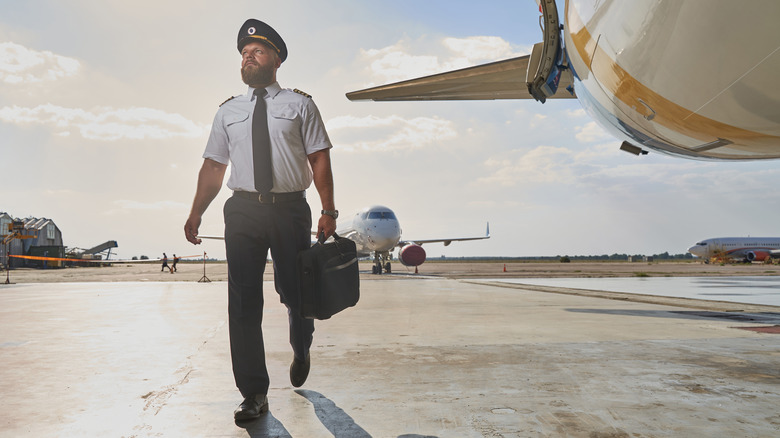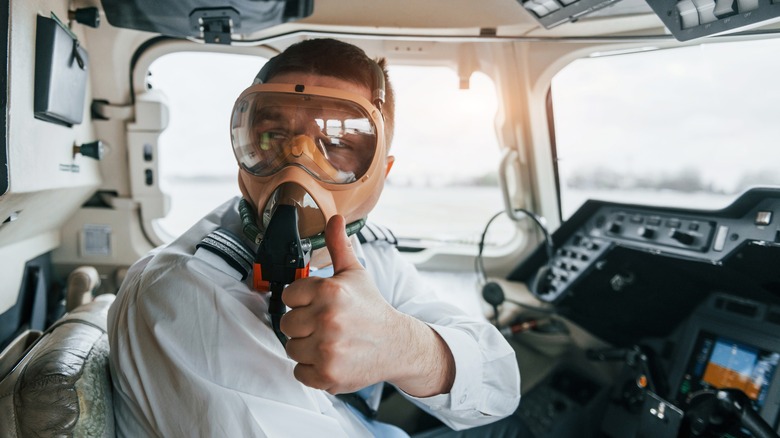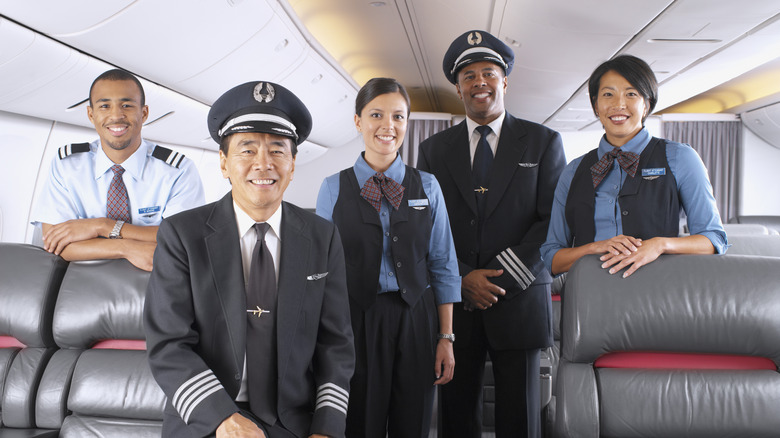The Bizarre Reason Some Airlines Have Strict Rules About Pilots With Facial Hair
Have you ever seen a pilot with facial hair? Really, think about it. A fancy beard, handlebar mustache, mutton chops, anything? Probably not. A pilot is usually clean-shaven — not even a five o'clock shadow in sight — as if fresh out of the barbershop. While this may seem like a very particular grooming choice, there's actually a specific and somewhat bizarre reason why most major airlines enforce rules about pilots having facial hair. (But, perhaps this should come as no surprise, as pilots aren't even allowed to eat the same food as passengers.)
This facial hair rule isn't really about maintaining a polished professional appearance — but is instead rooted in decades-old safety protocols. Let's travel back in time to 1987. The Federal Aviation Administration (FAA) released a study called "The Influence of Beards on Oxygen Mask Efficiency." The FAA's goal was to determine whether beards lower the effectiveness of oxygen masks — including half masks, full masks, and respirators — in case of an emergency. They conducted various tests on both pilots and flight attendants.
The result? "Bearded crewmembers should be aware that oxygen mask efficiency is reduced by the presence of facial hair," reads the official document. What's more, "Demand masks, such as those used in protective breathing equipment, many times cannot be donned rapidly nor seal effectively when used by bearded individuals." The FAA has never set forth an explicitly written "no beards allowed" rule; however, as a result of this study, most airlines have adopted clean-shaving policies for their pilots.
The importance and science behind the oxygen mask
Oxygen masks are critical lifesaving safety devices that are designed to supply pilots with breathable air in the event of a sudden cabin depressurization or other in-flight emergencies where the cabin atmosphere becomes compromised. For the masks to work effectively, they need to form a tight seal against the skin, ensuring that no outside air can enter and that the oxygen supply is delivered directly to the user. Even a small leak can render the mask ineffective and cause loss of consciousness.
The oxygen masks used by pilots are different from those provided to passengers. While passengers typically use yellow drop-down masks called "Dixie cups" that create a basic fit around the nose and mouth, pilots use a more sophisticated mask known as a full-face or quick-don oxygen mask. This mask covers the entire face, including the nose, mouth, and sometimes the eyes, and it's intended for use at higher altitudes — up to 40,000 feet — where the air pressure is significantly lower.
Facial hair, particularly beards, mustaches, or even stubble, can interfere with this seal. The hair creates gaps between the mask and the skin, allowing potentially hazardous air to seep in and compromise the effectiveness of the mask. With a beard, an average of 16% to 67% of ambient air leakage can happen at altitudes of 18,000 feet — no small percentage. This could prevent the pilot from receiving the necessary oxygen in an emergency, putting both the crew and passengers at risk.
Airline policies and other considerations
As a result, many airlines have implemented grooming policies that require pilots to be clean-shaven. Some airlines have made exceptions to limit facial hair to styles that don't interfere with the oxygen mask seal. For example, Delta allows sideburns so long as they don't extend beyond the middle of the pilot's ear, while Hawaiian permits full beards only if they are neatly trimmed. Mustache-loving pilots should fly with Southwest Airlines, which approves mustaches that don't cover more than 50% of the upper lip. Overall however, these exceptions are few and far between.
Recently, there has been increased discussion about how these grooming policies intersect with cultural, religious, and even skincare practices. Many practicing Muslims, Sikhs, Norse, and Orthodox Jews are required to grow a beard as part of their religion and culture. Shaving it would go against their identity and beliefs. Does a pilot really have to choose between their career or their faith? For others, shaving daily for that clean, professional aviator look causes skin irritation and razor bumps and is simply not possible.
Some airlines may accommodate these concerns with religious exemptions or more relaxed rules, but this still remains a complex issue with no one-size-fits-all answer. The aviation industry has some strange requirements for flight attendants as well, so pilots aren't alone in this. While it might seem odd that something as simple as facial hair could have such implications, the reality is that in aviation, safety must always come first.


